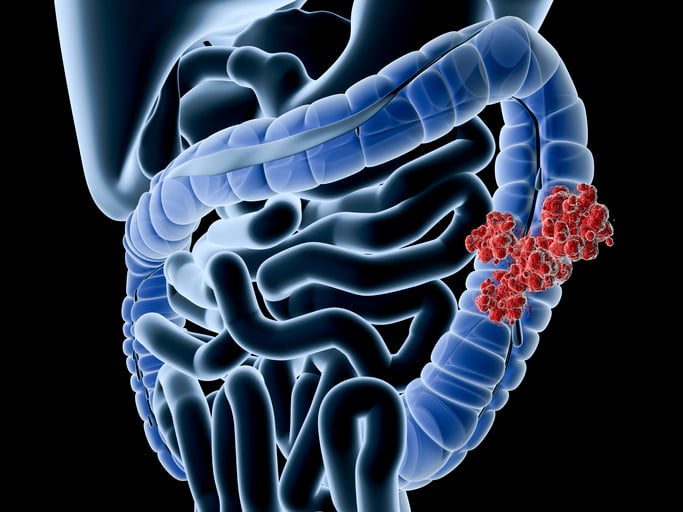
5 Ways Seniors Can Lower the Risk of Colorectal Cancer
What you eat plays an essential role in health and wellness, especially as you get older. From heart disease and diabetes to various types of cancer, your diet impacts personal risk for disease. One of those is colorectal cancer. Research shows the dietary choices you make are likely linked to whether you develop colorectal cancer or not.
In honor of National Colorectal Cancer Month in March, it is important to raise awareness about the lifestyle choices that might put people at higher risk for this serious disease.
Defining the Disease
The term colorectal cancer is used to describe a cancer that begins in the colon (the large intestine) or the rectum. It starts as a growth, known as a polyp, that develops into cancer.

There are many types of colorectal cancer, but adenocarcinomas are the most common. They make up about 96% of all cases. Adenocarcinomas begin in the cells that create mucus to lubricate the inside of the colon and rectum.
Cancerous polyps often cause very few, if any, symptoms early in the disease. Here are the most common signs of colorectal cancer:
- Persistent change in bowel habits
- Weakness or fatigue
- Unexplained weight loss
- Rectal bleeding or blood in the stool
- Continued abdominal cramps, pain, or gas
- Feeling that the bowel won’t empty completely
A procedure known as a colonoscopy is considered the gold standard for early detection. When caught early, up to 85% of all cases of colorectal cancer can usually be treated.
Colorectal Cancer by the Numbers
Colorectal cancer is the third most common form of cancer in this country. The American Cancer Society estimates that there will be 106,180 new cases of colon cancer in 2022, and 44,850 cases of rectal cancer. While early detection and intervention among older adults have led to a decrease in the number of people diagnosed since the mid-1980s, the disease is on the rise among younger people.
The death rate from colorectal cancers for adults under the age of 64 is increasing. For people between the ages of 50 and 64, rates have climbed by 1% a year. For those under the age of 50, the rates are rising by 2% a year. This has caused the American Cancer Society to recommend screenings begin at age 45 instead of the previous guideline of age 50.
While some risk factors for colorectal cancer are unavoidable, including age and family history, others are linked to lifestyle choices. By being mindful of certain choices, you may be able to lower your odds of developing this disease.
Lifestyle Factors Linked to Colorectal Cancer
What you eat might play a role in either increasing or lowering your risk of developing colorectal cancer. Research seems to suggest that incorporating fruits, vegetables, and whole grains into meals may decrease your risk. Experts believe the fiber in these foods provides protection against colon and rectal cancers.
By contrast, there are foods that are thought to put you at higher risk. A diet that is high in meats including beef, pork, liver, and lamb might contribute to colorectal cancer. Processed meats, hot dogs, sausage, bacon, and some types of lunch meats, are also believed to impact risk.
There are other lifestyle choices that may unknowingly be increasing your chances of colon or rectal cancers. Here are a few:
- Smoking
Smokers and people who live or work in close quarters with a smoker have a higher risk for colorectal cancer. - Lack of Exercise
As is true of many types of cancer, exercise plays a role in preventing it. Studies show people who regularly exercise are 30% to 40% less likely to develop colorectal cancer. - Being Sedentary
While the reason isn’t clear, there are 3 forms of cancer that are linked to living a sedentary life. These are breast, endometrial, and colon cancers. - Abusing Alcohol
According to the National Cancer Institute, those who consume a moderate to heavy amount of alcohol on a regular basis are up to 1.5 times more likely to develop colorectal cancers than those who don’t drink.
We encourage you to share this information with friends and family to help increase awareness of this disease that is largely curable with early detection.
Aging with Success
Another resource you may find useful when it comes to learning more about wellness and older adults is A Guide To Staying Healthy During Your Senior Years. It covers topics ranging from aging myths to living life to the fullest each day. 
About Presbyterian Senior Living
PSL is a mission-driven organization that lives our values of integrity, mutual respect, creative curiosity, and connectedness. Building on a legacy of 96 years, we provide residential and care services to more than 6,000 seniors in 27 locations across the mid-Atlantic region of Pennsylvania, Maryland, Ohio and Delaware.

